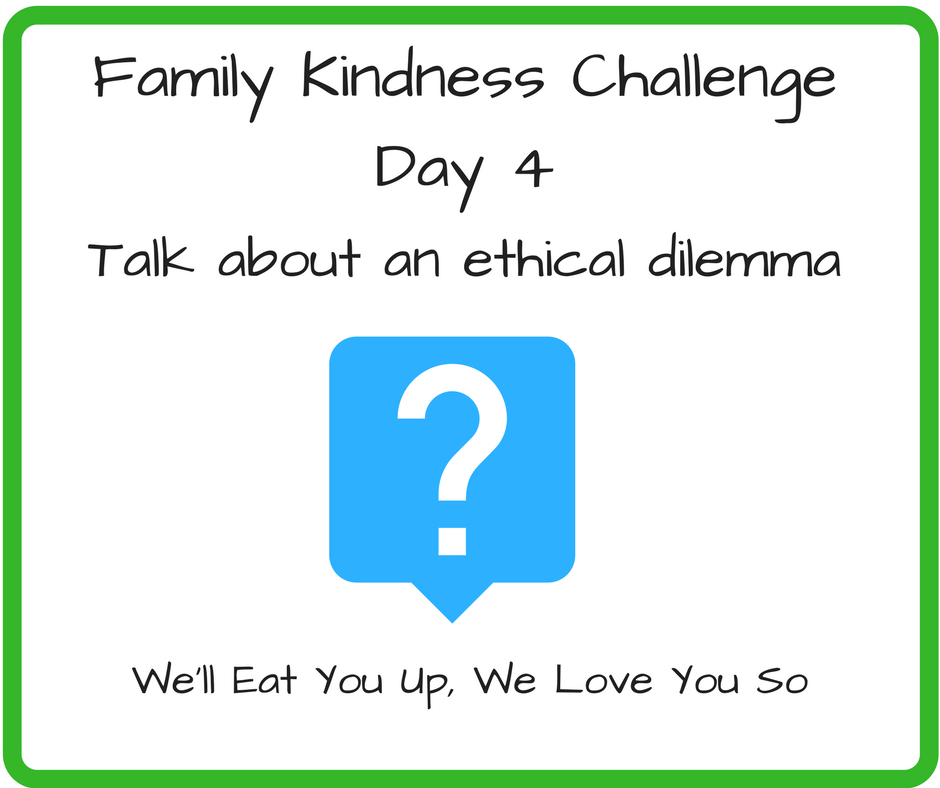The Activity:
Kindness really shines through in the most difficult of situations. All too often, we freeze up or turn away when we’re most needed.
Thankfully, we can help our kids prepare for those situations by talking about them or role-playing before they ever happen. Discussing these situations also helps kids build emotional intelligence and practice empathy for others.
For younger kids, you can talk through a scenario where someone acts unfair or unkind. Some scenarios could include seeing one kid push another, grabbing a toy from another kid, or calling someone a name. Small children have a very strong sense of fairness, starting even before they’re a year old and peaking in third grade. While little kids frequently do things to us that seem unfair, they only do that because they lack the big picture thinking to realize it (it seems fair to them!) or they lack the self-control to stop themselves (haven’t we all had those days?). If you ask them to imagine it happening to them and what they would want someone to do, they can gain that perspective more easily than we realize.
For older kids, you can tackle pricklier situations. These can include:
- What do you do if you hear a friend using a racial slur or making a racist joke?
- What do you do if you see someone inappropriately touch someone else against their will?
- What would you do if one of your friends is being bullied?
Be sure to listen more than you talk. Also, feel free to admit that you don’t know all of the answers! Even the conversations with little kids can be challenging.
Our Experience:
For us, the opportunity to have this conversation came up in a rather unfortunate way. As a matter of fact, the ethical dilemma wasn’t hypothetical at all – it was discussing my son’s behavior from earlier in the day.
My four-year-old either keeps a huge distance from people or has zero concept of personal space. We’re really trying to teach him how to respect people’s personal space as a simple act of courtesy.
A few weeks ago, he didn’t remember those lessons at all. While he was waiting in line at a trampoline playspace, there was a kid ahead of him with a yarmulke. For some reason, he decided it was appropriate to touch the kid’s head and then get in his face. The kid was very understandably peeved. I pulled my son aside and reprimanded him, “We Do NOT touch people’s heads. We need to give them space.”
Then, later in the day, I realized I had missed a major part of the puzzle. Of course, we don’t touch people’s heads. But just like if he had touched a black kid’s head, there was much more to that interaction than just a personal space issue. Even if my son didn’t mean to be prejudiced – which I’m sure he didn’t – the kid may have not seen it that way.
So in his brother’s room, with my son in the big chair in the corner and me leaning against the changing table, we discussed what happened. I explained, “Sometimes, people who are different from you may think you’re making fun of them.” He replied, “But I wasn’t.” I continued: “I know you weren’t. But that kid had no way of knowing that. So when people are different from you, you have to be extra careful to treat them with respect. Because a lot of people don’t just because they’re different.”
Talking to my son about something he clearly did wrong was hard. Really hard. Even though he wasn’t trying to be anti-Semetic, even seeing something that felt that way hit me hard in my mama heart. But I just couldn’t let it pass by. It was far too important of a conversation to skip.
